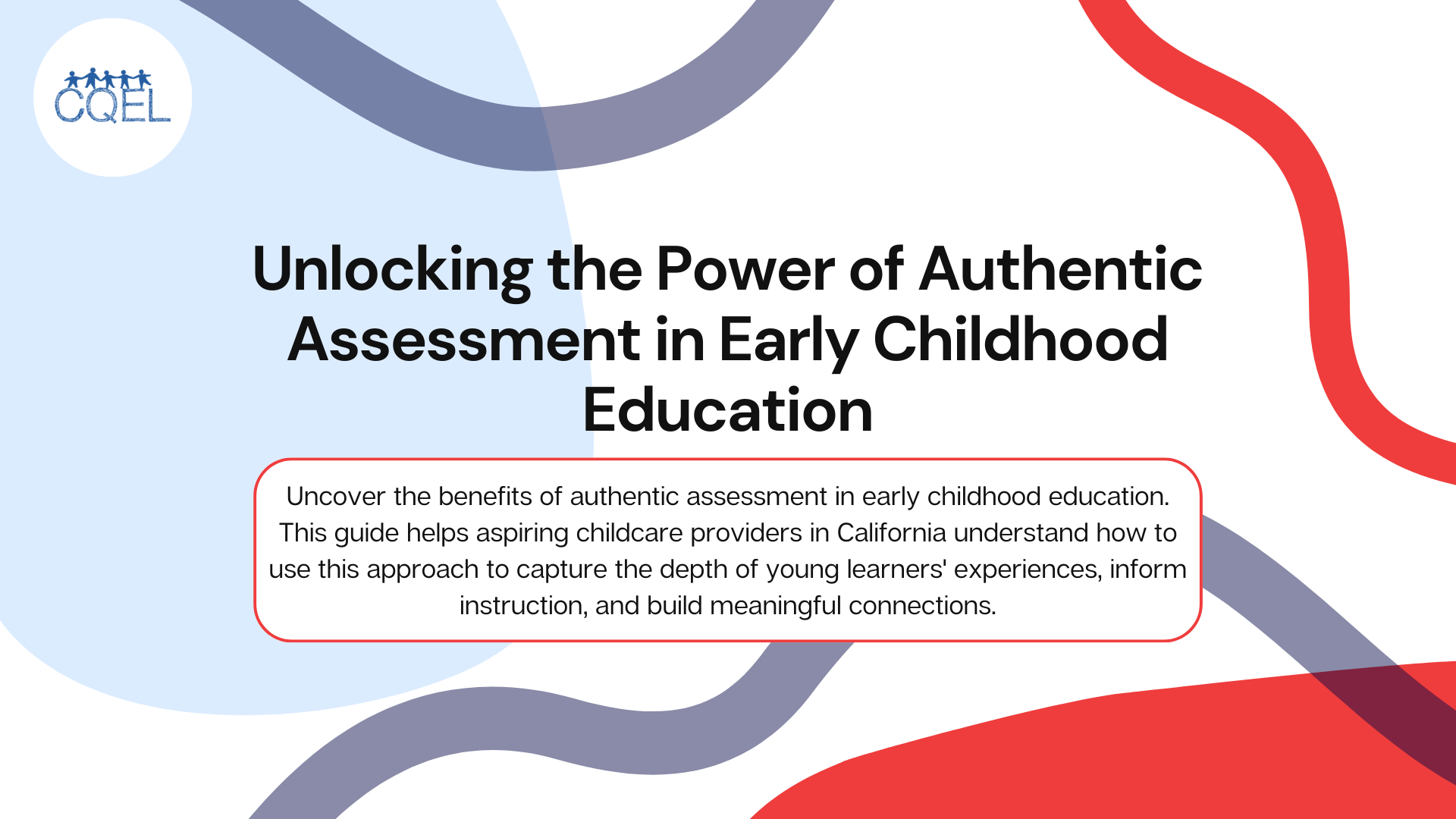Unlocking the Power of Authentic Assessment in Early Childhood Education
Learn how aspiring childcare providers in California can use this holistic approach to understand and support children's development, moving beyond traditional methods to gain valuable insights and inform instruction.

In the dynamic realm of early childhood education, assessment serves as a cornerstone for understanding and supporting children's development. However, traditional assessment methods often fail to capture the depth and richness of young learners' experiences. Enter authentic assessment—a transformative approach that transcends standardized tests to offer a holistic understanding of children's abilities, interests, and progress. Aspiring childcare providers in California are poised to harness the potential of authentic assessment to glean valuable insights, inform instruction, and build meaningful connections with the children they serve. Let's embark on a journey to explore the intricacies of authentic assessment and its profound impact on early childhood education.
What is Authentic Assessment?
Authentic assessment represents a paradigm shift in evaluation practices, moving beyond conventional standardized tests to embrace real-world contexts and meaningful tasks. Rooted in the belief that assessment should reflect children's authentic experiences, interests, and capabilities, this approach prioritizes observation, documentation, and reflection. It emphasizes the importance of capturing children's learning within the context of their daily interactions, activities, and play. Unlike traditional assessments that focus solely on academic achievement, authentic assessment recognizes the interconnectedness of social, emotional, cognitive, and physical development.
Benefits of Authentic Assessment
The benefits of authentic assessment are manifold, offering a comprehensive view of children's development while fostering meaningful connections with both children and families. By capturing the full spectrum of children's abilities and interests, authentic assessment provides educators with invaluable insights for tailoring instruction and individualized support. Moreover, it promotes a collaborative approach to assessment, engaging families as partners in the process and honoring children's voices and contributions. Through authentic assessment, educators can create nurturing environments that celebrate diversity, promote equity, and cultivate a lifelong love for learning.
Tools and Strategies for Authentic Assessment
Implementing authentic assessment requires a repertoire of tools and strategies designed to capture children's learning experiences authentically. Observation-based techniques, such as anecdotal records and running records, offer valuable insights into children's behaviors, interactions, and achievements. Documentation practices, including photography, video recordings, and learning stories, provide tangible evidence of children's growth and development over time. Additionally, engaging children in self-assessment and reflection empowers them to take ownership of their learning journey, fostering agency and self-awareness.
Challenges and Considerations
While the benefits of authentic assessment are undeniable, its implementation may pose challenges for childcare providers. Time and resource constraints, including limited staffing and competing priorities, can impact the feasibility of comprehensive assessment practices. Furthermore, ensuring equity and cultural responsiveness in assessment requires ongoing reflection, professional development, and collaboration with colleagues and families. Navigating assessment practices in early childhood settings demands a commitment to continuous improvement, flexibility, and adaptability to meet the diverse needs of children and families.
Implementing Authentic Assessment in California Childcare Settings
In California, childcare providers can leverage resources and support systems to effectively implement authentic assessment practices. Aligning with the California Early Learning Guidelines and Standards ensures that assessment practices are responsive to the developmental needs and cultural backgrounds of children. Professional development opportunities, such as those offered by the Child Development Training Consortium, provide educators with the knowledge and skills necessary for successful implementation. Additionally, membership benefits, such as access to the Directors Coffee Break through CQEL, offer opportunities for networking, collaboration, and problem-solving among childcare directors.
Resources:
- CQEL - Directors Coffee Break: www.caqualityearlylearning.org/benefits
- California Early Learning and Development Guidelines: https://www.cde.ca.gov/sp/cd/re/documents/preschoollf.pdf
- California Department of Education - Child Development Training Consortium: https://www.childdevelopment.org/
In conclusion, authentic assessment stands as a cornerstone of quality early childhood education, offering a holistic approach to understanding and supporting children's development. By embracing observation, documentation, and reflection, childcare providers can create nurturing environments that honor children's unique strengths, interests, and identities. Aspiring childcare providers in California are poised to harness the power of authentic assessment to promote equity, foster meaningful connections, and empower children to thrive. Through ongoing reflection, collaboration, and commitment to continuous improvement, educators can unlock the full potential of authentic assessment in shaping the future of early childhood education.
